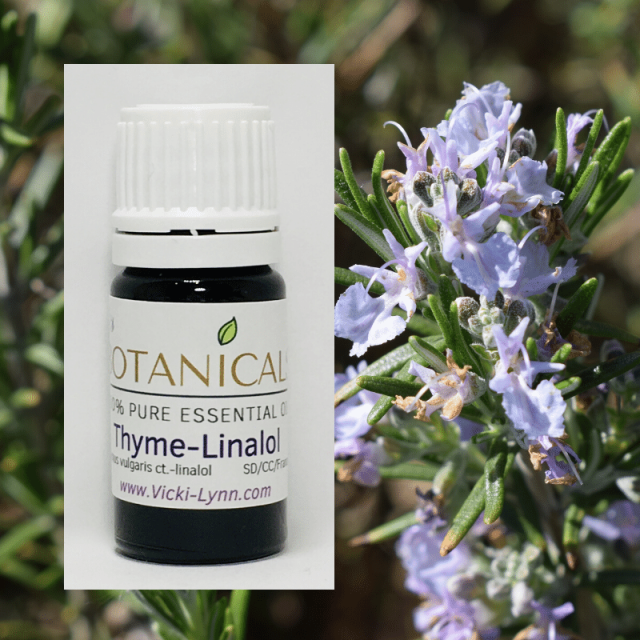- Vicki's Botanicals
- >
- Thyme - Linalol
Thyme - Linalol
THYME ESSENTIAL OIL
Size: 5 ml. Violet glass bottle
Botanical Name: Thymus vulgaris, ct-linalol
Source: France
Method: Distilled from leaves and aerial parts
**Shipping fee's will be invoiced separately**
Thyme essential oil linalol chemotype can be inhaled to relieve mental fatigue, nervous exhaustion, and stress. It stimulates the central nervous system, offering support to dementia, schizophrenia, and mental deficiencies.
It can help to relieve fears and phobias, violent tendencies, and uncontrolled sexual responses. It is best inhaled from a diffuser or from an inhaler for these purposes.
Homeopathic Properties
Analgesic • Antibacterial • Anti-infectious: effective against staph, strep, meningitis, candida • Ani-microbial • Antirheumatic • Antispasmodic • Anti-tussive • Anti-viral • Bronchodilator • Carminative • Depurient: stomach & intestinal • Digestive • Expectorant • Respiratory • Parasticide • Stimulant: immune system, circulatory system • Vermifuge
Uses
Internal–oral, inhalation, suppository
External––topical application, massage, local or spinal compress, application to energy centers and meridian points
Observations and Anecdotal Information
Aromatic Profile
Top note: Sweet, fresh, herbaceous, medicinal notes
Heart Note: Herbaceous, green, woody, spicy notes
Base Note: Herbaceous, spicy, woody notes
Classification:
Tenacity: Medium
In natural perfumery thyme essential oil linalol chemotype is used in making herbal notes, sacred perfumes, colognes, fougeres, and spice notes. It is best used in trace amounts as the aroma is potent and could easily overwhelm a blend.
Blends well with rosemary, sweet anise, or eucalyptus smithii.
Observations & Anectodal Information
This special chemotype of Thymus vulgaris contains linalol, the sweet floral note contained in lavender. Because of the high linalol content, this thyme is softer and gentler on the skin without losing its powerful antibacterial and anti-infectious properties. It is a bronchodilator, opening the breathing passages and clearing congestion and respiratory inflammation. v
This oil can be taken internally (at proper dilution rates) to support recovery from all types of infectious dis-eases and conditions.
Cautions
- Generally recognized as safe at normal dosage.
- Avoid essential oil contact with eyes. Some people find it to be irritating when diffused. If this happens, try diluting it with other, softer oils such as combava, petitgrain, rosemary, or lavender.
- Do not use with infants and small children, unless directed by a health care professional.
- Do not use during pregnancy or lactation.
- Store safely out of the reach of children.
- All internal uses should be researched and/or supported by a health care professional. Product quality and dosage are critically important when using essential oils internally.
**Shipping fee's will be invoiced separately**
The information on this website is not intended or implied to be a substitute for professional medical advice, diagnosis or treatment. These statements have not been evaluated by the Food and Drug Administration. If you are pregnant, nursing, taking medication, or have a medical condition, please consult your physician and do your research before using these products. All information is provided for educational purposes and should not be viewed as health claims.


